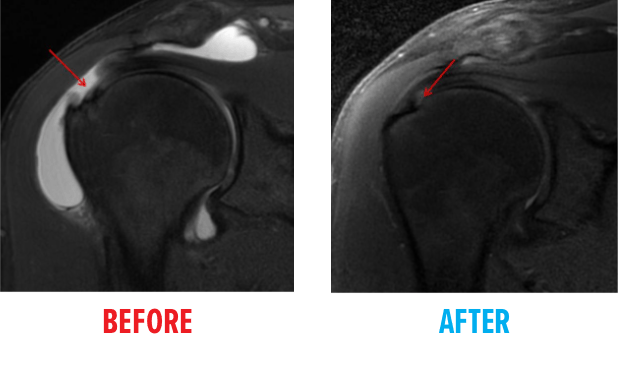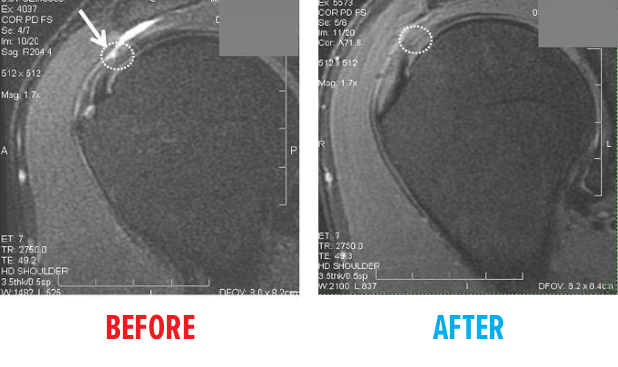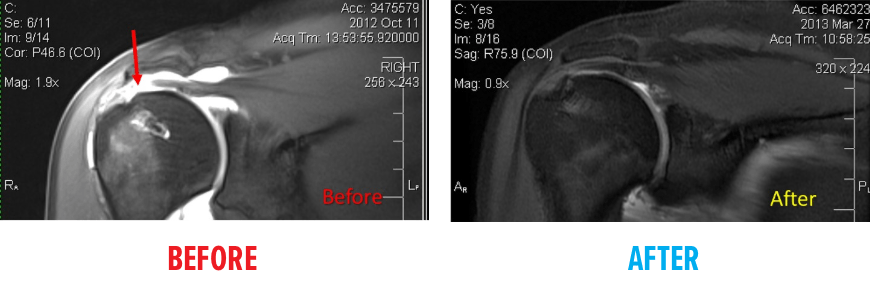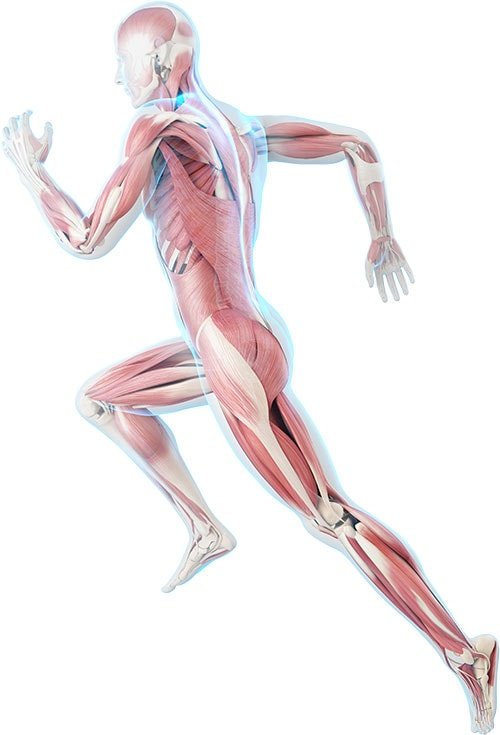Shoulder MRI
These patients had a tear in the supraspinatus tendon. The arrow is pointed at the tear which displays a gap where the tendon should be. You can view the MRI after image on the right to see the gap has gone away. These patients used their own bone marrow concentrate, which contained their stem cells, placed precisely into the tendon tear using ultrasound guidance.



Free Regenexx® Webinar

Join Chris Centeno, M.D., founder of Regenexx, to learn about how Regenexx procedures can treat your orthopedic injury.
View WebinarFind a Regenexx Provider
Regenexx is a world-wide network of specially trained physicians providing the world's most advanced, research-driven, regenerative interventional orthopedic procedures in North America, Europe, the Middle East, Asia and Australia.
Types Of Meniscus Tears And Their Impact On Mobility
Decoding Meniscus Tears Grades: What You Need To Know
What To Expect After Arthroscopic Knee Surgery
9th Circuit Reverses California CSN Stem Cell Decision

Many Shoulder and Rotator Cuff injuries are good candidates for regenerative interventional orthopedic procedures. Before considering shoulder arthroscopy or shoulder replacement, consider an evaluation of your condition with a regenerative treatment specialist.
- Rotator Cuff Tears and Tendinitis
- Shoulder Instability
- SLAP Tear / Labral Tears
- Shoulder Arthritis
- Other Degenerative Conditions & Overuse Injuries
Many spine injuries and degenerative conditions are good candidates for regenerative treatments and there are a number of studies showing promising results in treating a wide range of spine problems. Spine surgery should be a last resort for anyone, due to the cascade of negative effects it can have on the areas surrounding the surgery. And epidural steroid injections are problematic due to their long-term negative impact on bone density.
- Herniated, Bulging, Protruding Discs
- Degenerative Disc Disease
- SI Joint Syndrome
- Sciatica
- Pinched Nerves and General Back Pain
- And more
Knees are the target of many common sports injuries. Sadly, they are also the target of a number of surgeries that research has frequently shown to be ineffective or minimally effective. Knee arthritis can also be a common cause for aging athletes to abandon the sports and activities they love. Regenerative procedures can be used to treat a wide range of knee injuries and conditions. They can even be used to reduce pain and delay knee replacement for more severe arthritis.
- Knee Meniscus Tears
- Knee ACL Tears
- Knee Instability
- Knee Osteoarthritis
- Other Knee Ligaments / Tendons & Overuse Injuries
- And more
Many spine injuries and degenerative conditions are good candidates for regenerative treatments and there are a number of studies showing promising results in treating a wide range of spine problems. Spine surgery should be a last resort for anyone, due to the cascade of negative effects it can have on the areas surrounding the surgery. And epidural steroid injections are problematic due to their long-term negative impact on bone density.
- Herniated, Bulging, Protruding Discs
- Degenerative Disc Disease
- SI Joint Syndrome
- Sciatica
- Pinched Nerves and General Back Pain
- And more
- Hand and Wrist Arthritis
- Carpal Tunnel Syndrome
- Trigger Finger
- Thumb Arthritis (Basal Joint, CMC, Gamer’s Thumb, Texting Thumb)
- Other conditions that cause pain
Most injuries of the elbow’s tendons and ligaments, as well as arthritis, can be treated non-surgically with regenerative procedures.
- Golfer’s elbow & Tennis elbow
- Arthritis
- Ulnar collateral ligament wear (common in baseball pitchers)
- And more
Hip injuries and degenerative conditions become more common with age. Do to the nature of the joint, it’s not quite as easy to injure as a knee, but it can take a beating and pain often develops over time. Whether a hip condition is acute or degenerative, regenerative procedures can help reduce pain and may help heal injured tissue, without the complications of invasive surgical hip procedures.
- Labral Tear
- Hip Arthritis
- Hip Bursitis
- Hip Sprain, Tendonitis or Inflammation
- Hip Instability
- Ankle Arthritis
- Plantar fasciitis
- Ligament sprains or tears
- Other conditions that cause pain

